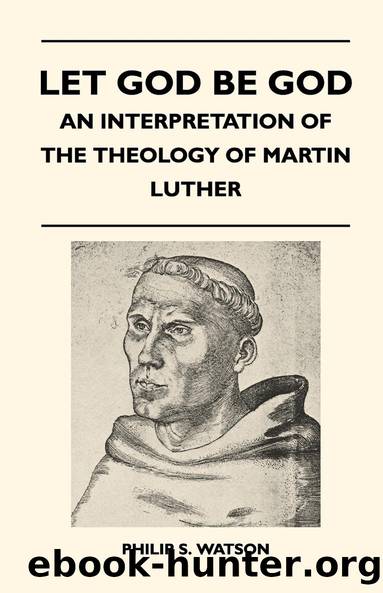Let God Be God - An Interpretation Of The Theology Of Martin Luther by Philip S. Watson

Author:Philip S. Watson [Watson, Philip S.]
Language: eng
Format: epub
Tags: Religion, Christian Theology, History, Christianity, General
ISBN: 9781579105082
Google: potKAwAAQBAJ
Publisher: Wipf and Stock Publishers
Published: 2000-10-17T00:45:33+00:00
14. CHRIST AS INTERPRETER OF THE LAW
(a) The Condemnation and Curse of the Law
Although Christâs interpretation of the Law is described by Luther as merely His âaccidental or by-officeâ, it is of very considerable importance, not only for the understanding of His proper office as Luther conceives it, but also for the explanation of the apparently contradictory attitudes which, as is well known, Luther himself adopts toward the Law. We must therefore devote some attention to this matter before we go on to consider the work of Christ as Saviour.
The Law of God, as Luther understands it, is revealed in three main stages. The first is the Natural law, or the awareness which, as we have seen, all men naturally have, that they ought to worship God, and that they ought to do to others as they would have others do to them. The second is the Mosaic law, the Decalogue, of which the first table states more explicitly manâs duty to God, and the second his duty to his neighbourâMoses being not so much the lawgiver as an interpreter of the Law already given by nature but obscured by sin. The third stage is that of the Gospel commandment of love toward God and our neighbour, by which our Lord reveals the true inwardness of the Law, and which He illustrates both by His teaching and His example. These three stages in no sense represent different ethical principles, but are all alike expressions of the one Law of God, which alone is binding on the whole world.29 They differ only in the degree, so to speak, in which they reveal the essential meaning and content of the Law. This content is nothing more nor less than love.30 Love is the requirement of the law of Nature31 and of the law of Moses32 no less than of the commandment of Christ, in whose light alone their true significance is seen.
If we are rightly to understand the Law, Luther holds, we must first of all distinguish between the âmoralâ and the âspiritualâ observance of it,33 or between âdoing the works of the Lawâ and âfulfilling the Lawâ.34 The works are done, when our behaviour conforms to the letter of the Law, even though in our hearts we would rather do otherwise, were it not for the constraint of the commandment. The Law is fulfilled, however, only when our behaviour is governed by love in our hearts, and love of such a kind that we would âdo the worksâ even if they were not commanded. This fulfilment is what the Law essentially and inexorably requires. Unlike the laws of men, Godâs Law cannot be satisfied merely with works, for God judges according to what is at the bottom of the heart, and His Law makes its demands upon the inmost heart and will.35 It requires perfect love, free from every selfish consideration. It can therefore be fulfilled only by a pure heart and a cheerful will, such as are entirely unmoved by any thought of penalty or reward.
Download
This site does not store any files on its server. We only index and link to content provided by other sites. Please contact the content providers to delete copyright contents if any and email us, we'll remove relevant links or contents immediately.
The Secret Power of Speaking God's Word by Joyce Meyer(3167)
Signature in the Cell: DNA and the Evidence for Intelligent Design by Stephen C. Meyer(3125)
Real Sex by Lauren F. Winner(3006)
The Holy Spirit by Billy Graham(2942)
The Gnostic Gospels by Pagels Elaine(2526)
Jesus by Paul Johnson(2351)
Devil, The by Almond Philip C(2324)
23:27 by H. L. Roberts(2245)
The Nativity by Geza Vermes(2226)
Chosen by God by R. C. Sproul(2159)
All Things New by John Eldredge(2157)
Angels of God: The Bible, the Church and the Heavenly Hosts by Mike Aquilina(1952)
The Return of the Gods by Erich von Daniken(1927)
Angels by Billy Graham(1920)
Knowing God by J.I. Packer(1852)
Jesus of Nazareth by Joseph Ratzinger(1802)
The Gnostic Gospel of St. Thomas by Tau Malachi(1782)
Evidence of the Afterlife by Jeffrey Long(1776)
How To Be Born Again by Billy Graham(1775)
